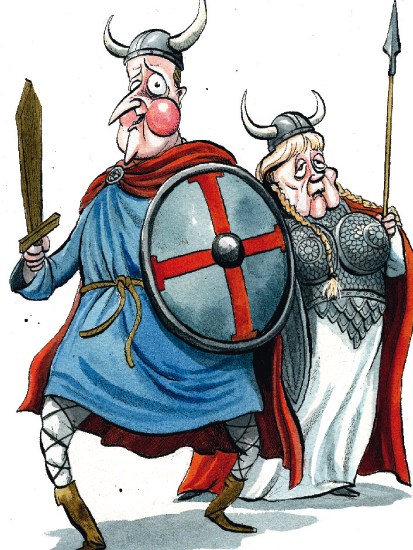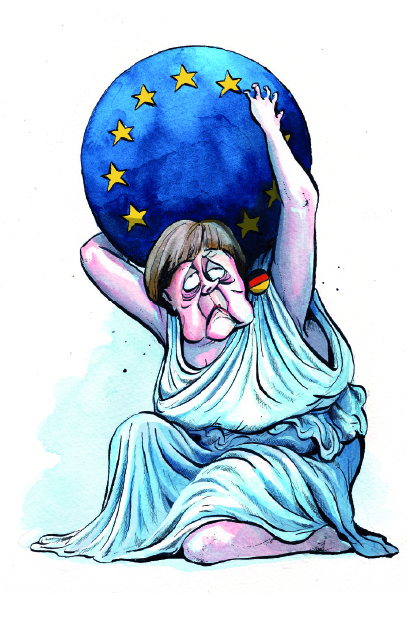Angela Merkel is misunderstood. Last winter, when Russia moved to annex Crimea after the overthrow of Ukraine’s government, American officials put it about that the German Chancellor had described Russia’s leader Vladimir Putin as ‘living in another world’ and ‘out of touch with reality’. No evidence has emerged that she ever said any such thing.
Europhiles in the press and in Westminster have now pulled the same trick on David Cameron. The Prime Minister has lately been ruminating about quotas for migrants from certain European Union countries. He complained last month when an unannounced £1.7 billion upward adjustment in Britain’s EU payment turned out to be triple the levy on anyone else. (France and Germany are getting rebates of around a billion euros apiece, and George Osborne hopes to negotiate some sort of delay or reduction for Britain.) Cameron has pushed back a long-planned Europe speech till after the 20 November Rochester by-election, a sign he believes he’ll lose it to Ukip. The consequence was a rather innocuous story in the German newsweekly Der Spiegel which, without quoting Merkel, said that for the first time she considered a British EU exit ‘possible’.
Something got lost in translation. The papers had Merkel ‘ready to cast UK adrift’ (Belfast Telegraph) and telling Cameron he had to ‘accept EU rules or quit’ (Express). And Nigel Farage tweeted: ‘German paper Der Spiegel reports Berlin wants UK EU exit if we try and limit immigration. Still think you can renegotiate, Mr Cameron?’ Cameron was suddenly portrayed as being on no more intimate terms with reality than the Bare-Chested Bolshevik himself — and on the same authority. By now, Frau Merkel must worry that the English-speaking world considers her a terrible gossip.
But the whole story of what Merkel said is implausible. She is surely not angry that Cameron might lead Britain out of the EU; she is more likely frightened that he might follow Britain out of the EU.
For all their differences, Merkel’s predicament regarding the EU resembles Cameron’s. So does her disposition. Rare enough among contemporary European leaders, she is a patriot. Like Cameron, she thinks of nations as good for things other than tourism, and her favourite country is her own. She badly wants Britain in the EU, as a bulwark against its turning into an inflationary ‘transfer union’. She, too, is calling for ‘transition controls’ regarding migration from new EU member states. She wants more say for national parliaments over EU law. (Even if, confusingly, she insists on more EU say over budget-busting national parliaments.)
And she is astute enough to see that she could soon be facing a Ukip-style crisis of her own. Alternative für Deutschland, the anti-euro party that nearly made it into the Bundestag last year, has won 35 seats in state parliamentary elections since then. AfD is not as radical as it is portrayed in the press. When I interviewed a bunch of its members at a conference in Berlin last year they had a very sophisticated critique of the European Central Bank and the various EU rescue funds, and not much else. But the party has broadened its portfolio to include migration, and the nature of the bank bailouts has drawn it into Ukip territory on the issue of national sovereignty. To read through the surge of comments that follow stories on Cameron in the German press is to be struck by the sympathy for his edgier rhetoric — particularly regarding immigrant quotas.
These passions are dangerous for establishment politicians because the two sides of EU issues are not symmetrical. Probably 60 per cent of Britons approve of the EU in the sense that it gives them a few conveniences they wouldn’t otherwise have; 40 per cent believe a bunch of liars are stealing, wrecking, or abolishing their beloved country.
What puts Merkel and Cameron at odds is the very different national systems they are trying to find a place for. The German constitutional order is an intentionally gummed-up machine, except in matters of monetary policy. The euro crisis is precisely the kind of crisis German statesmen have, over the decades, excelled at resolving. It involves meeting several mutually contradictory goals in a way that leaves as few dangerously disgruntled people as possible. Merkel wants more sovereignty for Germany but she understands the benefits of being in a union that keeps Germany’s currency from hardening to the point where its exports are unaffordable. She wants to be a good European neighbour, but she cannot bow to the Greek understanding of what this means — putting German assets at other countries’ disposal. She is on Britain’s side, but she cannot offer the kind of concessions Cameron seeks.
British people have this idea of the EU as a kind of philosophical abstraction that one is either ‘for’ or ‘against’. It is that, but Europe exists on a more pragmatic level, too, as a zero-sum system of privileges and pay-outs. If Britain is permitted to cap the number of Romanian migrants it receives per year, those migrants are going to show up on the streets of Berlin. So Merkel would never bow to a British opt-out on migration policy, even if she took Cameron’s view of the matter. She might, however, follow a British line if it could be turned into a continent-wide policy. Her fellow Christian Democrat Gunther Krichbaum, chairman of the EU affairs committee in the Bundestag, was much quoted as having said that Cameron would wind up with a bloody nose if he introduced a quota system. What Krichbaum actually said was that Cameron would get a bloody nose if he introduced quotas ‘unilaterally’ (einseitig).
Germans are sincere when they profess their inability to understand the ways of Westminster. Der Spiegel complained that Cameron was paying more attention to intra-EU immigration than extra-EU immigration. In this it is only voicing a bafflement common to all foreigners. The south-east of England has become a social welfare magnet and an international bazaar, and the locals are complaining about a few tens of thousands of self-sufficient Poles?
How does one explain this? Is it politically correct cowardice, Poles being a group one can reasonably discriminate against because they are Europeans? Is it that steady workers are actually more disruptive to labour markets than underground freelancers? Is it that non-EU immigrants are better viewed because they’re not free and therefore sortable? (With Saudis or Nigerians or Russians, you can separate the oil barons from the proles and wheel and deal a bit.)
Matters were probably not helped by Foreign Secretary Philip Hammond’s explanation a fortnight ago that an in-out referendum was a way of ‘lighting a fire under the European Union’. Hammond, of course, meant the sort of fire the British lit for world commerce with the steam engine. Many Europeans are now taking it to mean the sort of fire the English lit underneath Joan of Arc.
Got something to add? Join the discussion and comment below.
Get 10 issues for just $10
Subscribe to The Spectator Australia today for the next 10 magazine issues, plus full online access, for just $10.
Christopher Caldwell is a senior editor at the Weekly Standard and a columnist on the Financial Times.
You might disagree with half of it, but you’ll enjoy reading all of it. Try your first month for free, then just $2 a week for the remainder of your first year.














Comments
Don't miss out
Join the conversation with other Spectator Australia readers. Subscribe to leave a comment.
SUBSCRIBEAlready a subscriber? Log in